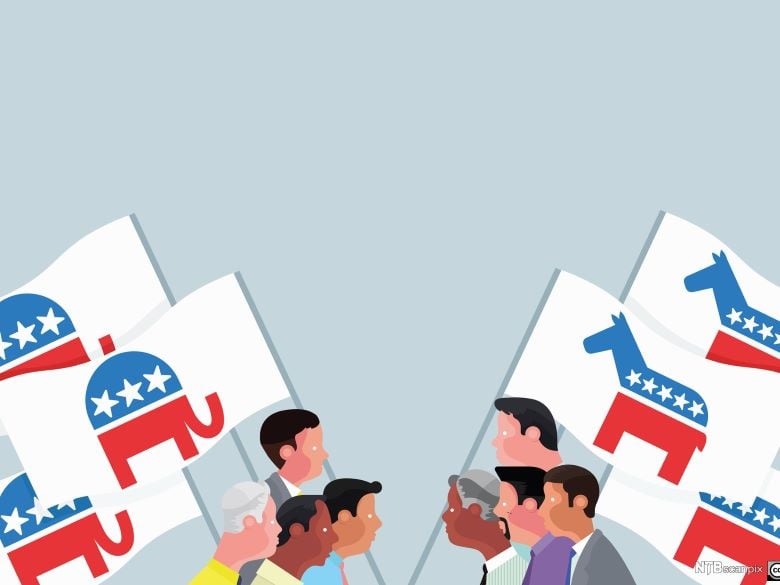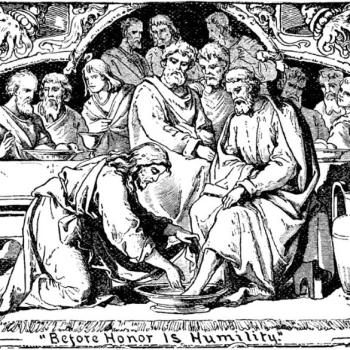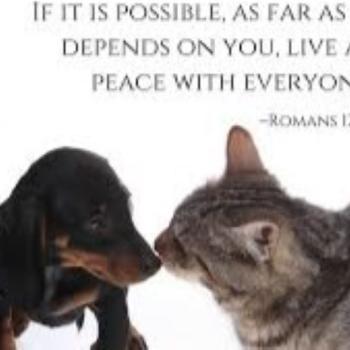As a Truthseeker, I am always looking to end arguments by finding the common ground. Unfortunately, our political process has no interest whatsoever in providing us with that. Our two-party system virtually guarantees an us-vs.-them mindset. This can only lead to two things:
- Polarization, where everything the other side does is completely evil, so instead of promoting your own ideas, you waste time bashing your opponents by attacking them personally rather than their policies.
- When your polls start dropping from the mudslinging, and the public starts to sympathize with your opponent, then you let the pendulum swing back toward the middle and call yourself a “moderate.” There may be such a thing as an actual moderate, but often, it’s somebody that was once far right or left that has compromised his principles to curry favor with voters whose lives he cares little, if anything, about.
Don’t be hatin’…
A tension that I struggle with all the time, but especially in election season, is the temptation to hate on people who disagree with me politically.
As a Truthseeker, I tend to stay out of the political arena (where truth is seldom, if ever, found). However, it seems inevitable these days that whenever you voice a view, no matter how pure your intentions, whoever is on the receiving end of it is sure to put some kind of political spin on it. Next thing you know, you’re in an argument.
As I have said before, a Truthseeker must never argue. The minute that we are convinced that we are right, and nothing can convince us otherwise, we cut ourselves off from receiving the latest information. It could be that the one thing we don’t know is the one thing we need to know to lead us to the truth.
Furthermore, if you become convinced that your limited knowledge is all that you need to know, you will resent anybody who is trying to educate you. You will have the perception that he is “trying to push his views down your throat.” Your emotional reaction will be one of hostility.
What will happen next is that you will project your hostility toward that individual in that moment onto the view itself, and by extension, everyone else who holds that view. That is how you create a “them.”

Confirmation Bias
For every “them,” there must be an “us” to balance it. So instead of seeking Truth, you start seeking people who will agree with you.
It’s not that hard to do in this age of technology. For example, social media lets us create an alternate reality where, with canny use of the “mute” feature, everyone in your virtual world thinks you’re brilliant. You must be, or why would you have so many “likes” on your last post with nobody disagreeing with you?
Well of course everybody agrees with you. After all, you aren’t friends with any of “them.” Now you have your own custom-designed “us.”
Now here’s where this gets especially dangerous for Truthseekers. As I mentioned before, if you’re busy building your “us,” you have taken your eye off the truthseeking.
The Echo Chamber
Let me put this in the context of Christianity. Those of you who are Christians, do you spend most of your time and energy seeking God? Or are you seeking other Christians to build you up and make you feel better about yourself? Nothing wrong with being built up or feeling good about yourself but remember that God is the one who builds up and tears down ultimately.
You don’t need self-esteem when you know whose you are and in whose image you were created. Other Christians can sharpen you by challenging you, educating you and edifying you, but the true tests of Christian character come from interactions with “the world,” which is church-speak for “everyone who’s not a Christian.”
Yes, that means we have to be around “them.”
Guess what, Christian? Before you were one of “us,” you were one of “them.” Remember?
You don’t want to remember, do you?
Do it anyway.
Before I was One of Us
How old were you when you accepted Christ as not just your savior from sin and death, but as the Lord of your life in the here and now? Some of you did it as a child, and don’t have many memories of how you were before.
I was thirty-three when I finally closed the deal, so I have a LOT of memories, some of them painfully fresh. Satan reminds me of them every day, trying to tell me how unworthy I am of God’s grace, which of course backfires on him, because I already KNOW that. That’s why it’s called grace—because you don’t deserve it.
So, when attempting to make me beat myself up doesn’t work, Satan reminds me of “them.”
“Those morons, those degenerates, just LOOK at them! Flaunting their perversions in broad daylight, acting as if they were the normal ones, tearing “us” down at every opportunity, blindly following the left like lemmings.”
Oops, tipped my hand a bit there, didn’t I?
But here’s the thing. I voted for Bill Clinton in 1992. By 1994 I fiercely regretted that decision, but on election day 1992, I was at the Macon County Courthouse as the election results were pouring in, watching politicians sweat, pace and mutter to themselves. I looked at my wife, at the seven and a half months’ worth of swelling in her belly that would soon come into the world as my first child. I felt exhilaration, and hope. Hope for change. I even briefly considered naming the child Hillary if it was a girl (it wasn’t.)
Why did I feel these things, even though there was no logical reason for me to have that hope? Because I was one of “them.”

Who Are ‟Them” Really?
Now we come to the heart of it. There really is no “them.” There is just one big “us.” We all need the same things, though we need them in different ways. We need to be loved, we need to feel safe, and we need to know that we have hope for our future.
However, whenever we place our trust in worldly things that divide us into “us” vs. “them,” we will always be disappointed. Because our needs will not be met.
We won’t feel loved if someone hates us because we hated them first. We won’t feel safe if we feel that someone is out to get us. And if we feel neither loved nor safe in the present, then it becomes impossible to have hope for the future. We become depressed, desperate. We look for somebody to blame. So, we create a “them.”
It doesn’t meet any of our needs to have a “them.” But we feel better about ourselves in the moment we are condemning “them.” We feel better, because if there is a “them,” that means there is an “us.” And “we” are “one of us.”
In other words, we feel like we belong to something. And belonging is kind of like being loved, right?
So next, we want to be safe.
The only way for “us” to be safe is for “us” to protect ourselves against “them.” Therefore, there needs to be more of “us.” So, we need to tell everybody we meet that if they’re not one of “us,” then they’re one of “them.” And you don’t want to be one of “them,” do you? Because if you’re one of “them,” then, well, you’re not one of “us.”
Does that sound a lot like the current political climate to you? Are you as unsatisfied with it as I am? Well, here’s the reason.
You can pretend that you are loved by creating an artificial sense of belonging to an “us.” You can pretend that you are safe by surrounding yourself with more of “us.” Nevertheless, even if you can delude yourself that far, what you can’t do by yourself is fulfill your third need—hope for the future.
Enter the politicians.

They play on your first two needs by creating two teams, Republican and Democrat. Or if you like, “us” and “them” (or “them” and “us,” depending on which party you belong to).
By declaring your party affiliation, you belong. Then the party to which you belong will remind you that you need to be safe from “them.” This is so that you can have . . . wait for it . . . A HOPE AND A FUTURE!
Isn’t that politics in a nutshell? Barack Obama’s 2008 campaign was pure genius in that he distilled the fears of a nation to a single word— “HOPE.” Then he set down the means of providing hope also to a single word— “CHANGE.”
Now before you go beating up on Barack Obama for the HOPE/CHANGE thing, be honest for a minute. Doesn’t every politician do a variation of the same thing?
Obama’s approach was the simplest and most literal, but they all play on the people’s need to have a hope and a future. The main difference between Democrats and Republicans is this. Democrats say the government provides hope for your future. Republicans say they provide the means for government to get out of your way so you can create your own hope and future.
Guess what? They’re both wrong.
(And to find out why, you’ll have to come back for part 2. If you click on Free Newsletter above, you’ll get notified as soon as it goes live.)












